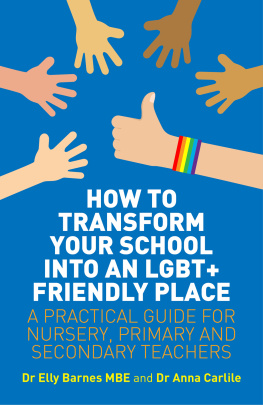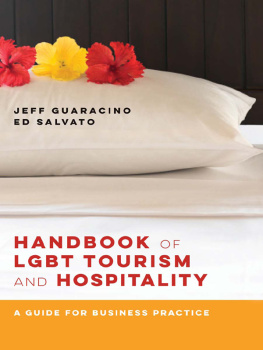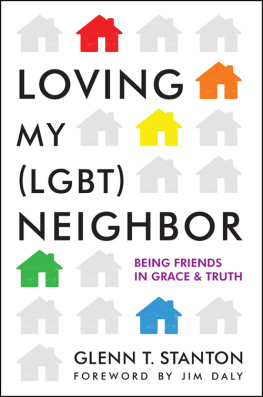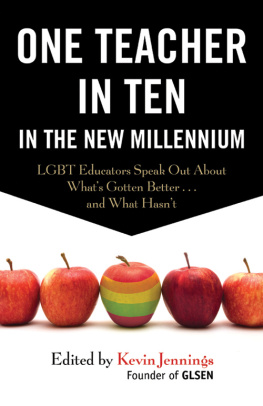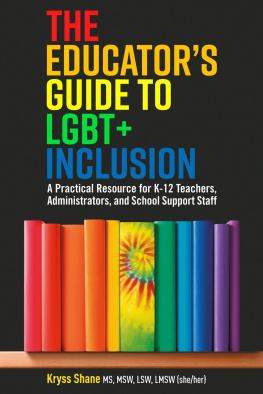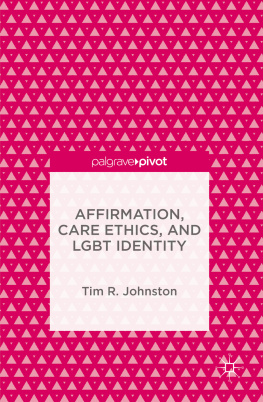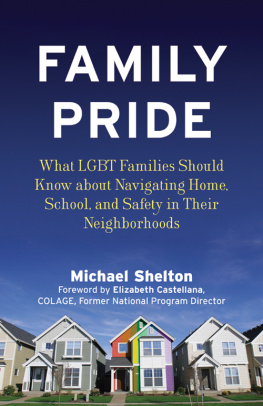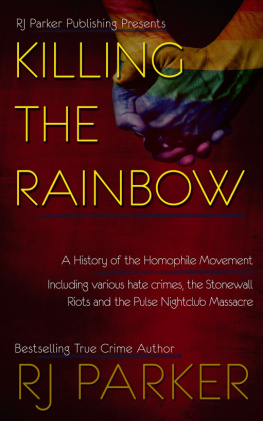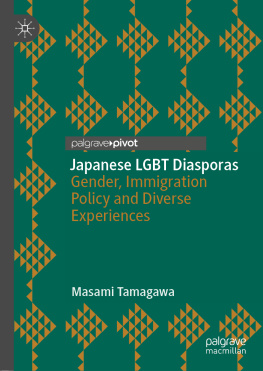
HOW TO
TRANSFORM
YOUR SCHOOL
INTO AN LGBT+
FRIENDLY PLACE
A PRACTICAL GUIDE FOR
NURSERY, PRIMARY AND
SECONDARY TEACHERS
Dr Elly Barnes MBE & Dr Anna Carlile

Jessica Kingsley Publishers
London and Philadelphia
Contents
Preface
Did you know that making your nursery or school LGBT+ (lesbian, gay, bisexual, transgender, plus other associated categories such as queer, questioning, intersex and asexual) friendly is a legal requirement? The specific duties enshrined in the Equality Act 2010 require public bodies to publish relevant, proportionate information showing compliance with the Equality Duty, and to set equality objectives. This book helps nurseries and schools to set objectives in the chapter on policy, and to achieve those objectives in the chapters on curriculum, environment, community and Pride Youth Networks.
Dr Elly Barnes, MBE
Who would like to live in a land where all are treated equally and fairly?
Every day, my job lets me know that we have a long way to go on our journey to inclusion. Working on the basis of us all jumping on the rainbow bus forthwith, there is a chance we can reach the land of social justice before I leave this earth! However, we can only do this with full participation from education from the get go, starting in nurseries and primary schools, allowing the next generation to grow up experiencing equality and recognising diversity as a regular part of life.
Sadly, in 2017, regardless of all the achievements in legislation, there are still teachers who are fearful of being themselves or who feel uncomfortable advocating for the inclusion of sexual orientation and gender identity. Just recently I met someone who was forced to leave their last four teaching posts due to homophobia, biphobia and transphobia. How can this be, when government and school policies embrace diversity?
Has much really changed in terms of hearts and minds since I was growing up in the 1970s and 80s? Yes, some positive changes have occurred, but we are still having to challenge negative attitudes that are influenced by the current political climate, bigotry, the excuse of tradition and the perceived reality of the heteronormative model. Thankfully, its no longer just me, Martina Navratilova and Larry Grayson, but assuredly a whole new visibility of queerness that is beginning to be embraced by schools and communities and with good reason too, as around 10 per cent of the population could potentially identify as LGBT+ (the famous sexualities statistician Kinsey established this figure in relation to gay men in 1948, but of course it is probably more, as he was not looking at women, bi or trans people). In school terms, this is up to three students in every class we teach, so representation is paramount.
Since my teenage years in the Leicestershire countryside I have found myself in all sorts of relationships with all sorts of people. I identified as a lesbian for a number of years but have always been sceptical of using labels, both personally and in my teaching, as I view both sexual orientation and gender identity as fluid and subject to change at any point in a persons life. Little did I know that being open within my profession as a music teacher and head of year, and that teaching my kids its okay to fancy who you like would lead to a whole new career, an MBE and a doctorate! You just never know what is around the corner.
Language has been key in developing strategies for institutional change, so I use the term LGBT+ friendly to describe the aim of my interventions and the objective for all schools and organisations to pursue. It refers to establishing an environment that embraces all sexual orientations and gender identities so there is no fear of discrimination based on these grounds.
My research has shaped the development of the Educate & Celebrate Best Practice Award Programme by examining the benefits and barriers, the successes and failures that occurred in the process of transformation and the search for definitive strategies to create LGBT+ friendly schools, predominantly based on my teaching at Stoke Newington School in North London where the programme originated in 2005. In 2012, we received Ofsted Best Practice Status for taking a whole-school approach to tackling homophobic bullying and ingrained attitudes. Ofsted wrote of our programme, this approach has been highly successful and subsequently in 2016 it described it as innovative and visionary.
In 2012, my post with Birmingham City Council allowed for further pilot studies and research with schools in the West Midlands, including nursery, primary, secondary, special, further education, higher education and initial teacher training through the universities and the teaching schools. This invaluable experience in all phases of education informed the research for my Masters by exploring the impact of interventions and the needs of teachers.
With that in mind, the Educate & Celebrate programme is ever-evolving as more successful interventions manifest themselves through my research. However, it remains streamlined into five core areas for intervention: training, policy, curriculum, environment and community. Ongoing research with staff, students, parents and governors ensures that we are continually providing the guidance, services and resources that schools want and need.
In November 2014, the Educate & Celebrate programme became a charity, and in April 2015 we were awarded our first major funding from the Department for Education and the Government Equalities Office to create 60 further Best Practice Award schools in England, with Dr Anna Carlile from the Department of Educational Studies at Goldsmiths, University of London, as our independent evaluator. We were thrilled to receive validation of our strategies in the NatCen evaluation, which reported that we had created a shift in emphasis from reaction to prevention of homophobic, biphobic and transphobic (HBT) bullying, along with making LGBT+ people part of everyday existence, therefore reducing bullying because LGBT+ people no longer seemed unusual. Where before one of the teachers we worked with felt that he couldnt or shouldnt use words like gay or lesbian with a child in primary school, he now felt confident in being able to answer pupils questions around, for example, what a lesbian is. For the teacher, a key reason behind this was that the Educate & Celebrate training provided him with more detailed information about the Equality Act 2010, which highlighted the importance of LGBT+ inclusion in schools. The teacher felt this gave him permission to talk about LGBT+ issues more openly in his school.
In July 2017 we had 120 Best Practice Award schools, with another 50 schools in the UK and Channel Islands beginning their journey to LGBT+ inclusion in the autumn of 2017, along with our Pride Youth Network and teacher training programmes, guidance and resources for all phases of education, including book collections, sing-along songs, lesson plans, posters and ongoing research, as well as our much-loved annual showcases and Great Rainbow Bake-Off.
All our trainers have made their own schools LGBT+ friendly and its our experiences as long-standing teachers that have fed the development of Educate & Celebrate, combined with a shared goal for social justice, a need to empower students to question the world around them and an absolute duty to give confidence, skills and resources that enable educationalists to effectively implement a whole-school approach to LGBT+ inclusion.
Going forwards, if we can ensure the addition of LGBT+ targets to achieving Qualified Teacher Status, provide com-pulsory LGBT+ training for practising and trainee teachers, add value to the curriculum, encourage and nurture pupil voice and establish a centrally funded distribution of inclusive and accessible resources, then we have the beginnings of a cohesive education system with people and social justice at its core.
Next page
